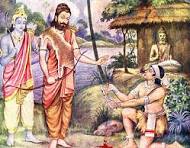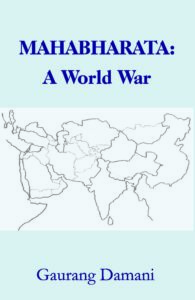 In the epic Mahabharata, Dwapara yuga was going to end soon and the immoral age of Kaliyuga was approaching. Many Asura-s began to reincarnate on planet Earth. Danava Viprachitti became well-known in the world as Magadha’s King Jarasandha. Daitya Kalanemi reborn as Mathura’s brutal Kansa. Daitya Hamsa came as Kuru dynasty’s Dhritarashtra. His son Duryodhana was Asura Kali himself (कलि, the obvious opposite of Goddess काली).
In the epic Mahabharata, Dwapara yuga was going to end soon and the immoral age of Kaliyuga was approaching. Many Asura-s began to reincarnate on planet Earth. Danava Viprachitti became well-known in the world as Magadha’s King Jarasandha. Daitya Kalanemi reborn as Mathura’s brutal Kansa. Daitya Hamsa came as Kuru dynasty’s Dhritarashtra. His son Duryodhana was Asura Kali himself (कलि, the obvious opposite of Goddess काली).
Ekalavya reincarnated from the ferocious Krodhavasha clan of Rakshasa-s. Ekalavya was born as the son of Yadava dynasty’s Nobleman Devashrava. He gave his son Ekalavya in adoption to his friend Nishada’s King Hiranyadhanusha. Thus, Ekalavya became the prince of the Nishada-s (forest-dwellers).
Due to the Asura’s inherent wicked and evil nature, the Gods also took birth on Earth to counter them.
Thereafter, the Pandava-s and Kaurava-s were studying weaponry under the guidance of Guru Drona. Apart from the Hastinapura’s princes, many others including the Yadava-s and Suta’s Prince Karna also come to learn. Supported by Duryodhana, a jealous Karna frequently defied Arjuna who ignored the provocations and continued his practice. As their Guru, Drona’s instructions were the same for everyone, but Arjuna was his most diligent student. Drona predicted that he will be the best archer in the entire world.
It is believed that Drona’s ashrama was in Dankaur in Uttar Pradesh state. This site has the only Drona temple in the world.
Ekalavya also approached Drona and requested to make him his student. Drona recognized his talent but refused as he thought he may surpass his beloved Arjuna. Ekalavya left for the forest and created a clay image of Drona and worshiped it like his real Guru. He worked hard and mastered the necessary skills in archery.
Once, the Pandava-s and Kaurava-s entered a forest on a hunting expedition with a lead dog. The dog’s barking disturbed the archery practice of Ekalavya. Ekalavya mercilessly shot 7 arrows into that dog’s mouth to make it stop barking and flaunt his skills. Arjuna felt insecure. When Drona inquired how he acquired such skills, Ekalavya gave a detailed explanation. Drona wanted Ekalavya to give a Guru-dakshina (fees) which he agreed. Drona asked for his right thumb as he did not want such an angry person to claim to be his outstanding student. Of course, Drona had a soft corner for the sincere Arjuna. Ekalavya complied with the demand and lost some deftness of his hand.
As per local folklore, this incident took place in the present-day Khaandsa near Gurugram in Haryana state. There is an Ekalavya temple in this village.
Even today, as a mark of respect for Ekalavya’s sacrifice, some pull the bowstring with their 2nd and 3rd finger but not the thumb:
- Chhattisgarh state’s Bhuinhars, Gonds, and Cherwas
- Bheels in the Alirajgarh district of Madhya Pradesh state
- Khasi people of Meghalaya state
Meanwhile in Mathura, God Krishna slayed Kansa. Magadha’s king Jarasandha was enraged as his 2 daughters Asti and Prapti (Kansa’s wives) were widowed. To attack Mathura, Jarasandha prepared 13 akshauhini-s (military phalanxes). Included were those jealous of Krishna’s prowess like Duryodhana, Subala (Shakuni’s father), Rukmi, and Ekalavya.
Jarasandha’s troops attacked Mathura but were defeated by Balarama, Krishna, and their minimal Yadava army. Though Jarasandha lost, the determined tyrant kept trying many times to finish off Balarama and Krishna. During one of those raids, Balarama slayed Jarasandha’s ally Kashmira’s King Gonanda. Krishna killed the hot-headed Ekalavya. Jarasandha was unsuccessful in all his 17 attacks on Mathura, but the Yadava-s moved to Dwaraka.
As time progressed, Yudhishthira became the prosperous king of Indraprastha. A gambling match followed, and then the forest exile. To regain Draupadi’s dignity and their kingdom, the Pandava-s fought and won the famous Mahabharata war.
Since so many of his relatives and others were dead in the war, Yudhishthira was guilt-ridden. As atonement for his sins, Yudhishthira wanted to retire and live like a sannyasi (renunciate) going door-to-door begging for food. His brothers pacified him that Grihastha-ashrama precedes Vaanaprastha-ashrama (the age of retirement) and Sannyasa-ashrama (renunciation). Draupadi reminded him of his Kshatriya duty to rule the world righteously, especially after winning such a difficult war. Devarishi Narada told Yudhishthira that death is inevitable for all beings, hence he should not grieve for the departed. Krishna guided him to offer pinda daana to the departed, and give gifts to priests. Krishna also narrated the Kaama Geeta to him. Maharishi Vyasa recommended doing prayaschitta (cleaning the consciousness or atonement) in this life rather than in the next ones. He instructed him to occupy the throne and perform an Ashwamedha yagnya which cleanses a Kshatriya’s sins.
So, King Yudhishthira’s declaration on a golden plate was tied to the horse which stated that anyone of greater might may stop his horse. Arjuna was appointed to follow the ceremonial horse. The king told Arjuna to avoid battles to the best of his abilities and to invite kings to the yagna. Arjuna worshiped God Ganesha and the Navagraha-s, and bowed before the elders. He left with Karna’s son Vrishaketu, Ghatotkacha’s son Meghanada, and other armed forces.
Most avoided a fight, except a few kingdoms like Gandhara, Saindhava, and Magadha’s Rajagriha. Further, Arjuna crushed many Mleccha-s in Banga, Pundra, and Kosala. Passing through other regions, he encountered Ekalavya’s son, the leader of the Nishada-s. Arjuna routed him but spared his life as he had done with other opponents. The horse, meandering through many other regions returned to Hastinapura. Then, Yudhishthira ruled for 36 years after the Mahabharata war.
This narration shows that Ekalavya was a Rakshasa reborn in the Yadava clan. He was given in adoption to a Nishada but had anger issues. He was not discriminated against as Drona also taught Karna in his ashrama. Ekalavya fought as Jarasandha’s ally against Dharma, and lost his life. Later, Ekalavya’s son lost against Arjuna.
This article is an excerpt from the book ‘Mahabharata: A World War’ by Gaurang Damani. The book is available at Padhega India and other online stores.
This article first appeared on the Hindu Post website.

